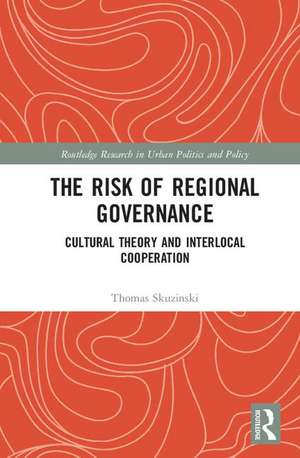The Risk of Regional Governance: Cultural Theory and Interlocal Cooperation: Routledge Research in Urban Politics and Policy
Autor Thomas Skuzinskien Limba Engleză Hardback – 21 sep 2017
The Risk of Regional Governance offers a new perspective on these questions. Drawing on theory from sociology and anthropology, it argues that many of the most important cooperative decisions local officials make—those about land use planning and regulation—are driven by heuristic, biased reasoning driven by cultural values. The Risk of Regional Governance builds a sociocultural collective action framework, and supports it with rich survey and interview data from hundreds of local elected officials serving in the suburbs of Detroit and Grand Rapids, Michigan. It is a story of the Rust Belt, of how local officials think about their community and the region, and—most importantly—of how we might craft policies that can overcome biases against regional governance.
Preț: 763.55 lei
Preț vechi: 1102.41 lei
-31% Nou
Puncte Express: 1145
Preț estimativ în valută:
146.14€ • 157.75$ • 122.54£
146.14€ • 157.75$ • 122.54£
Carte tipărită la comandă
Livrare economică 19 aprilie-03 mai
Preluare comenzi: 021 569.72.76
Specificații
ISBN-13: 9781138235755
ISBN-10: 113823575X
Pagini: 206
Ilustrații: 16 Line drawings, black and white; 15 Tables, black and white; 16 Illustrations, black and white
Dimensiuni: 152 x 229 x 19 mm
Greutate: 0.42 kg
Ediția:1
Editura: Taylor & Francis
Colecția Routledge
Seria Routledge Research in Urban Politics and Policy
Locul publicării:Oxford, United Kingdom
ISBN-10: 113823575X
Pagini: 206
Ilustrații: 16 Line drawings, black and white; 15 Tables, black and white; 16 Illustrations, black and white
Dimensiuni: 152 x 229 x 19 mm
Greutate: 0.42 kg
Ediția:1
Editura: Taylor & Francis
Colecția Routledge
Seria Routledge Research in Urban Politics and Policy
Locul publicării:Oxford, United Kingdom
Public țintă
Postgraduate and UndergraduateCuprins
1. Introduction. 1.1 Opting out 1.2 Governing metropolitan regions 1.3 The legitimacy of reform 1.4 Reform as a transaction 1.5 The limitations of economizing 1.6 Theoretical perspectives on metropolitan governance 1.7 The goals of the book 1.8 Evidence from metropolitan Michigan 1.9 The plan of the book 2. Governing the Region through Cooperation 2.1 The Manchester Community 2.2 The difficulty of structural reforms 2.3 The limitations of state and federal intervention 2.4 Distinguishing cooperation 2.5 Enabling cooperation 2.6 Awareness of the law 2.7 Conclusion 3. Beyond Economizing 3.1 Transaction cost economizing 3.2 Cooperation as a transaction 3.3 The individual in the local government organization 3.4 Some conceptual issues 3.5 Maintaining systems versus creating lifestyles 3.6 When reform seems irrational 3.7 Conclusion 4. Sociocultural collective action 4.1 Introduction 4.2 Revisiting rationality 4.3 Individuals and institutions 4.4 The appropriateness of regional reform 4.5 An illustration 5. Investigating Rules and Norms 5.1 Introduction 5.2 Economizing and reciprocity in preference formation 5.3 The norm of responsiveness in local government 5.4 The treatment of responsiveness in economizing studies 5.5 Evidence of political legitimizing 6. Cultural Legitimizing 6.1 From gay rights to gun control to governance 6.2 Grid-group cultural theory 6.3 Reconciling cultural theory with rational choice institutionalism 6.4 Connecting dispositions to governance 6.5 The cultural dispositions of local elected officials 6.6 Dispositions and partisan identity 6.7 Evidence of cultural legitimizing 6.8 Conclusion 7. Conclusion 7.1 Avenues for policy reform under legitimizing 7.2 Dealing with cultural pluralism through de-biasing 7.3 The prospects for regional governance through voluntary interlocal cooperation
Notă biografică
Thomas Skuzinski is Assistant Professor of Urban Affairs and Planning at the School of Public and International Affairs at Virginia Tech University. He holds doctoral and master degrees from the University of Michigan, and a law degree from Michigan State University. His work uses a sociological institutionalist lens to examine how the rules, norms, and cultures in which local government actors are embedded shape metropolitan governance.
Recenzii
'Thomas Skuzinski uses a study of local government land use planning in Michigan, specifically the metropolitan areas of Grand Rapids and Detroit, to make a compelling argument for a new approach to understanding regional governance. He applies his sociocultural collective action framework to analyze social and cultural factors to understand why political and civic leaders engage in, or avoid engagement in, local cooperative and collaborative governance processes. This book is a welcome addition to the literature on regional governance.' - David K. Hamilton, Director of the Center for Public Service, Texas Tech University
'Skuzinski’s work opens a promising avenue to explore the challenges and opportunities for interlocal collaboration and more effective regional governance. Beyond more evidence that agreements and consolidations are not all about the costs, his sociocultural collective action model advocates a theoretical turn that may nurture more politically viable structural reforms for a variety of public services.' - Kurt Thurmaier, Presidential Engagement Professor and Chair, Northern Illinois University
'Skuzinski’s work opens a promising avenue to explore the challenges and opportunities for interlocal collaboration and more effective regional governance. Beyond more evidence that agreements and consolidations are not all about the costs, his sociocultural collective action model advocates a theoretical turn that may nurture more politically viable structural reforms for a variety of public services.' - Kurt Thurmaier, Presidential Engagement Professor and Chair, Northern Illinois University
Descriere
The Risk of Regional Governance is a story of the Rust Belt, of how local officials think about their community and the region, and—most importantly—of how we might craft policies that can overcome biases against regional governance.





